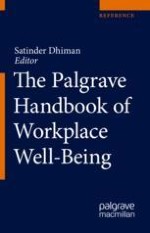2021 | OriginalPaper | Buchkapitel
4. How Chinese Conceptualize Employee Well-Being
verfasst von : Li Liu
Erschienen in: The Palgrave Handbook of Workplace Well-Being
Aktivieren Sie unsere intelligente Suche, um passende Fachinhalte oder Patente zu finden.
Wählen Sie Textabschnitte aus um mit Künstlicher Intelligenz passenden Patente zu finden. powered by
Markieren Sie Textabschnitte, um KI-gestützt weitere passende Inhalte zu finden. powered by
